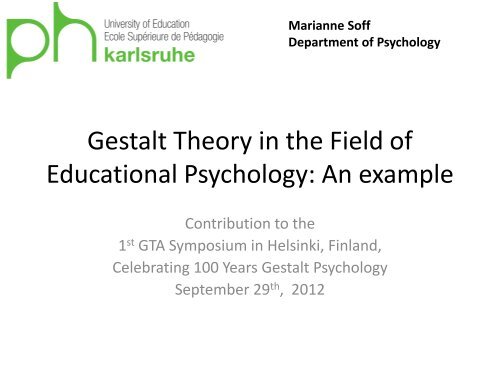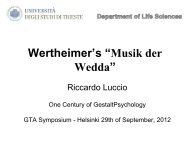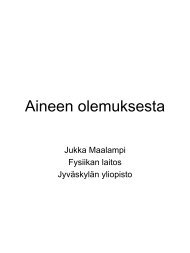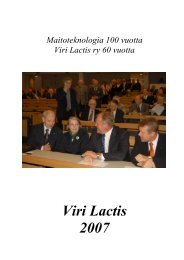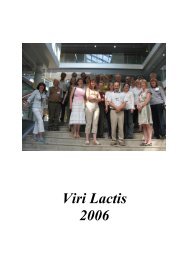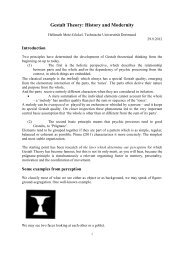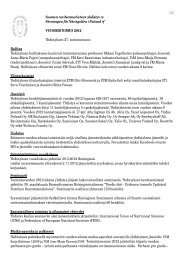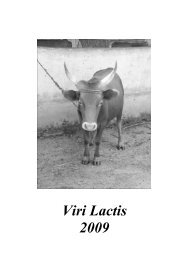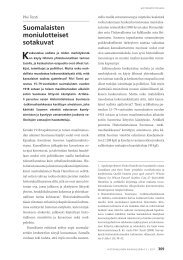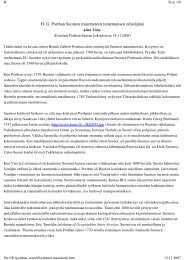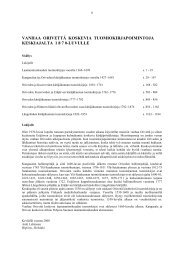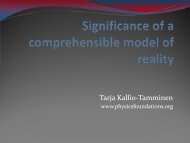Gestalt Theory in the Field of Educational Psychology
Gestalt Theory in the Field of Educational Psychology
Gestalt Theory in the Field of Educational Psychology
You also want an ePaper? Increase the reach of your titles
YUMPU automatically turns print PDFs into web optimized ePapers that Google loves.
Marianne S<strong>of</strong>f<br />
Department <strong>of</strong> <strong>Psychology</strong><br />
<strong>Gestalt</strong> <strong>Theory</strong> <strong>in</strong> <strong>the</strong> <strong>Field</strong> <strong>of</strong><br />
<strong>Educational</strong> <strong>Psychology</strong>: An example<br />
Contribution to <strong>the</strong><br />
1 st GTA Symposium <strong>in</strong> Hels<strong>in</strong>ki, F<strong>in</strong>land,<br />
Celebrat<strong>in</strong>g 100 Years <strong>Gestalt</strong> <strong>Psychology</strong><br />
September 29 th , 2012
<strong>Gestalt</strong> <strong>Theory</strong> <strong>in</strong> <strong>the</strong> <strong>Field</strong> <strong>of</strong> <strong>Educational</strong> <strong>Psychology</strong> -<br />
Introduction<br />
• <strong>Gestalt</strong> <strong>Theory</strong> (<strong>in</strong>clud<strong>in</strong>g <strong>Field</strong> <strong>Theory</strong>) as<br />
<strong>the</strong>oretical background for<br />
• applications <strong>in</strong> <strong>in</strong>terpersonal contexts<br />
• is useful, but<br />
• is no contemporary issue <strong>in</strong> <strong>the</strong> University<br />
education for prospective teachers<br />
M. S<strong>of</strong>f, 2012 2
<strong>Gestalt</strong> <strong>Theory</strong> <strong>in</strong> <strong>the</strong> <strong>Field</strong> <strong>of</strong> <strong>Educational</strong> <strong>Psychology</strong> -<br />
Structure <strong>of</strong> <strong>the</strong> Talk:<br />
• Introduction<br />
• <strong>Gestalt</strong> Theoretical & <strong>Field</strong> Theoretical Basics for<br />
Prospective Teachers<br />
• A Sem<strong>in</strong>ar at <strong>the</strong> University <strong>of</strong> Education<br />
– Circumstances and Preconditions<br />
– Topics and Schedule<br />
– What happened Own Observations and<br />
– Students‘ Feedback<br />
• Conclusions for Fur<strong>the</strong>r Sem<strong>in</strong>ars<br />
M. S<strong>of</strong>f, 2012 3
<strong>Gestalt</strong> <strong>Theory</strong> <strong>in</strong> <strong>the</strong> <strong>Field</strong> <strong>of</strong> <strong>Educational</strong> <strong>Psychology</strong> -<br />
<strong>Gestalt</strong> Theoretical Input for<br />
Prospective Teachers<br />
• some <strong>Gestalt</strong> Psychological basics<br />
• Epistemology: Critical Realism<br />
• Phenomenological Orientation<br />
• <strong>Gestalt</strong> Theoretical Anthropology<br />
• Basic ideas on learn<strong>in</strong>g and education <strong>in</strong> <strong>the</strong> sense <strong>of</strong><br />
Lew<strong>in</strong> and Metzger, concern<strong>in</strong>g:<br />
– learn<strong>in</strong>g and th<strong>in</strong>k<strong>in</strong>g as creative processes<br />
– motivation<br />
– social climate<br />
– characteristics <strong>of</strong> work<strong>in</strong>g at <strong>the</strong> liv<strong>in</strong>g<br />
M. S<strong>of</strong>f, 2012 4
Historical Start: <strong>Gestalt</strong> Theoretical Ancestors<br />
Max Wer<strong>the</strong>imer (1890-1943)<br />
Wolfgang Köhler (1887-1967)<br />
Kurt K<strong>of</strong>fka (1886-1941)<br />
Kurt Lew<strong>in</strong> (1890-1947)<br />
Wolfgang Metzger (1899-1979)<br />
5
A Sem<strong>in</strong>ar at <strong>the</strong> University <strong>of</strong> Education:<br />
Circumstances and Preconditions<br />
• Title: <strong>Gestalt</strong> <strong>the</strong>ory and <strong>Field</strong> <strong>Theory</strong> <strong>in</strong> <strong>the</strong><br />
context <strong>of</strong> education and development<br />
• Participants: 35 young women, 2 nd -6 th sem.<br />
• Pre-<strong>in</strong>formation about <strong>Gestalt</strong> <strong>Theory</strong>: <br />
• basic motivation: one more sem<strong>in</strong>ar,<br />
collect<strong>in</strong>g ECTS-po<strong>in</strong>ts<br />
• short preparation time<br />
M. S<strong>of</strong>f, 2012 6
A Sem<strong>in</strong>ar at <strong>the</strong> University <strong>of</strong> Education:<br />
Schedule<br />
• Introduction + Organization (team formation,<br />
literature) + Input <strong>Gestalt</strong> <strong>the</strong>oretical basics<br />
(2 lessons)<br />
• Consultation Time (2 lessons)<br />
• Presentations + Discussions (7 lessons)<br />
• Feedback (1 lesson)<br />
M. S<strong>of</strong>f, 2012 7
A Sem<strong>in</strong>ar at <strong>the</strong> University <strong>of</strong> Education:<br />
Presentation <strong>of</strong> 7 Special Topics based on<br />
<strong>Gestalt</strong> <strong>Theory</strong><br />
• creativity and productive th<strong>in</strong>k<strong>in</strong>g at school<br />
• motivational factors, learn<strong>in</strong>g and achievement<br />
• classroom-management, relationships and group<br />
dynamics<br />
• diversity and social <strong>in</strong>clusion <strong>in</strong> <strong>the</strong> classroom<br />
• development psychological ideas<br />
• a special topic: resistance (“Trotz”)<br />
• self-care for teachers<br />
M. S<strong>of</strong>f, 2012 8
A Sem<strong>in</strong>ar at <strong>the</strong> University <strong>of</strong> Education:<br />
What happened – own phenomenology<br />
• students <strong>in</strong>terested <strong>in</strong> <strong>the</strong> presentation <strong>of</strong> <strong>the</strong><br />
basics<br />
• literature for <strong>in</strong>troduction: frustrat<strong>in</strong>g<br />
• group formation + literature research<br />
• team presentations + discussions<br />
• atmosphere<br />
• quality <strong>of</strong> <strong>the</strong> presentations + essays<br />
M. S<strong>of</strong>f, 2012 9
Illustration GT Basics:<br />
Prägnanztendenz<br />
Beispiel für die Wirksamkeit der<br />
Prägnanztendenz <strong>in</strong> der Wahrnehmung:<br />
© Marianne S<strong>of</strong>f, 2009<br />
10
Illustration GT Basics:<br />
Epistemology, Critical Realism<br />
• „Die Systemgrenzen s<strong>in</strong>d nicht die Grenzen des<br />
E<strong>in</strong>zelorganismus“ (nach Metzger, 1976 3 )<br />
Darstellung<br />
nach Tholey<br />
& Utecht, 1989<br />
11<br />
© Marianne S<strong>of</strong>f, 2009
Illustration: Motivational Factors<br />
Lew<strong>in</strong> (1931) Die psychologische Situation bei Lohn und Strafe<br />
I. Die Situation bei Interesse an der Sache<br />
© M.S<strong>of</strong>f, 2011
Illustration: Developmental <strong>Psychology</strong><br />
Lebensraum auf zwei Entwicklungsstufen<br />
© M.S<strong>of</strong>f, 2011<br />
Quelle: Lew<strong>in</strong> (1946 <strong>in</strong> KLW Bd. 6, 385)
A Sem<strong>in</strong>ar at <strong>the</strong> University <strong>of</strong> Education:<br />
What happened – own phenomenology<br />
• students <strong>in</strong>terested <strong>in</strong> <strong>the</strong> presentation <strong>of</strong> <strong>the</strong><br />
basics<br />
• literature for <strong>in</strong>troduction: frustrat<strong>in</strong>g<br />
• group formation + literature research<br />
• team presentations + discussions<br />
• atmosphere<br />
• quality <strong>of</strong> <strong>the</strong> presentations + essays<br />
M. S<strong>of</strong>f, 2012 14
Students’ Feedback -1:<br />
What was a New Content for You<br />
25 Feedback-Sheets, free answers:<br />
• What is <strong>Gestalt</strong> <strong>Theory</strong>/<strong>Field</strong> <strong>Theory</strong> (5x)<br />
• Influence <strong>of</strong> GT/FT on psychology (2x)<br />
• Critical Realism for teachers (2x)<br />
• several aspects <strong>of</strong> developmental psychology (4x)<br />
• motivation, facilitation <strong>of</strong> motivation (2x)<br />
• self-care for teachers important to stay healthy (4x)<br />
• “I learned that it is important to see my future pupils as<br />
a whole and not to judge on <strong>the</strong> base <strong>of</strong> a s<strong>in</strong>gle<br />
impression”<br />
M. S<strong>of</strong>f, 2012 15
Students’ Feedback -2:<br />
Your most Important Theoretical Insight<br />
25 Feedback-Sheets, free answers:<br />
• Critical Realism (5x)<br />
• GT/FT <strong>in</strong> general as a <strong>the</strong>oretical background, solutions<br />
and explications on a variety <strong>of</strong> school topics (3x)<br />
• “The whole is not <strong>the</strong> sum <strong>of</strong> <strong>the</strong> pieces” (6x)<br />
• “Prägnanztendenz” <strong>in</strong> each human be<strong>in</strong>g + groups,<br />
anthropological aspects (4x)<br />
• Group lead<strong>in</strong>g, <strong>in</strong>fluence <strong>of</strong> educators (2x)<br />
• how to deal with stress, anger, “Trotz”, prejudices at<br />
school (3x)<br />
M. S<strong>of</strong>f, 2012 16
Students’ Feedback -3:<br />
Sem<strong>in</strong>ar Atmosphere<br />
25 Feedback-Sheets, free answers:<br />
• Good, agreeable learn<strong>in</strong>g climate (16 x)<br />
• relaxed atmosphere (3x)<br />
• open, frankly discussions (6x)<br />
• target-oriented, concentrated, discipl<strong>in</strong>ed (4x)<br />
• well-prepared presentations (3x)<br />
• it could have been more productive, group puzzle method<br />
<strong>in</strong>stead <strong>of</strong> plenary presentations (2x)<br />
• “For me, <strong>the</strong> congruence between <strong>Gestalt</strong> <strong>the</strong>oretical ideas<br />
<strong>of</strong> human be<strong>in</strong>gs and <strong>the</strong> style <strong>of</strong> <strong>the</strong> sem<strong>in</strong>ar leader was<br />
obvious and <strong>the</strong>refore practised <strong>in</strong> <strong>the</strong> whole sem<strong>in</strong>ar”<br />
M. S<strong>of</strong>f, 2012 17
Students’ Feedback -4:<br />
Suggestions for improv<strong>in</strong>g<br />
25 Feedback-Sheets, free answers:<br />
• better organizational structure/overview from <strong>the</strong><br />
beg<strong>in</strong>n<strong>in</strong>g (3 x)<br />
• more time / more help for organization <strong>of</strong> <strong>the</strong> groups and<br />
preparation <strong>of</strong> <strong>the</strong> presentations: (6 x)<br />
• more basic <strong>in</strong>formation at <strong>the</strong> beg<strong>in</strong>n<strong>in</strong>g/more <strong>in</strong>put<br />
lectures from <strong>the</strong> expert lecturer (7x)<br />
• less students’ presentations (5x)<br />
• more <strong>in</strong>formation material <strong>in</strong> completion (6x)<br />
• more <strong>in</strong>tegration, reflection, discussion after students’<br />
presentations (6x)<br />
M. S<strong>of</strong>f, 2012 18
<strong>Gestalt</strong> <strong>Theory</strong> <strong>in</strong> <strong>the</strong> <strong>Field</strong> <strong>of</strong> <strong>Educational</strong> <strong>Psychology</strong>: –<br />
Conclusions for fur<strong>the</strong>r Courses<br />
• GT & FT are obviously connective to a lot <strong>of</strong> contemporary<br />
discourses <strong>in</strong> <strong>the</strong> field <strong>of</strong> educational psychology<br />
• GT & FT as <strong>the</strong>oretical frames for teach<strong>in</strong>g and o<strong>the</strong>r<br />
processes concern<strong>in</strong>g schools are <strong>in</strong>terest<strong>in</strong>g for young<br />
students<br />
• sem<strong>in</strong>ar atmosphere with “model function”, at <strong>the</strong> same<br />
time a lot <strong>of</strong> ideas for improvement<br />
• comprehensible wish <strong>of</strong> more lecturers <strong>in</strong>put and support,<br />
but ma<strong>in</strong>tenance <strong>of</strong> active learn<strong>in</strong>g, self-read<strong>in</strong>g, <strong>in</strong>teractive<br />
teach<strong>in</strong>g<br />
• more time for questions and reassurement…<br />
M. S<strong>of</strong>f, 2012 19
Marianne S<strong>of</strong>f<br />
Department <strong>of</strong> <strong>Psychology</strong><br />
Invitation to <strong>the</strong><br />
18 th Scientific Convention <strong>of</strong> <strong>the</strong> GTA<br />
April 11-14, 2013<br />
University <strong>of</strong> Education, Karlsruhe<br />
www.gestalt<strong>the</strong>ory.net/gta/tagung<br />
Thank you<br />
for your Attention!


